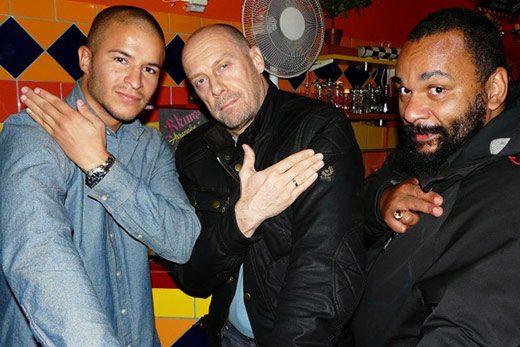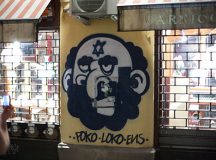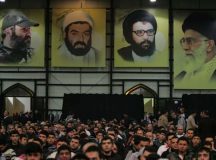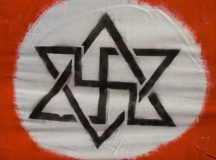When the Premier League footballer Nicolas Anelka celebrated a goal by performing a quenelle salute he touched off a storm of protest. Dave Rich examines the phenomenon of the quenelle and asks why it is now so easy for raw, old-fashioned antisemitism to be inserted into contemporary radical politics.
‘The scene is the Zenith de Paris theatre, December 2008. French comedian Dieudonné M’bala M’bala is on stage, describing to his audience the genesis of the sketch they are about to watch. It is a response, he explains, to a hostile review by the ‘billionaire philosopher’ Bernard-Henri Lévy – cue pantomime boos from the crowd – who had described Dieudonné’s previous show as ‘the biggest antisemitic meeting since the last world war.’
If you really want to ‘stick it to them the right way … to send them climbing up the wall,’ he tells his cheering, laughing fans (without ever defining ‘them’) you will welcome on stage ‘the most unfrequentable person in France.’ On walks Robert Faurisson, France’s best known Holocaust denier, to applause, with Dieudonné shouting ‘Louder! Louder!’; and the audience responds to Dieudonné’s appeals by greeting Faurisson with cheers and whistles of acclaim.
The punch line to the sketch comes when Dieudonné calls on stage his assistant Jacky, in his ‘suit of light’, to give Faurisson an award ‘for unfrequentability and insolence.’ Jacky’s ‘suit of light’ is a mocked-up concentration camp uniform, complete with stitched-on yellow star. ‘Photographers, let it rip!’ Dieudonné cries, as the three of them stand together on stage. ‘Look at the scandal! Let’s have an ovation!’ And an ovation is what they get. ‘I’ve been treated, in my country, like a Palestinian.’ Faurisson tells the audience, ‘I’m treated like a Palestinian and I can’t help making common cause with them.’
The manner in which Dieudonné manoeuvred a Parisian audience into expressing their anti-establishment sentiments by cheering Robert Faurisson (has he ever had such an ovation, even from an exclusively far right audience?) and laughing at Jacky’s ‘suit of light’, all on the premise of sticking it to ‘them,’ shows the ease with which raw, old-fashioned antisemitism can be inserted into contemporary radical politics. ‘Making common cause’ between Holocaust deniers, neo-fascists, the pro-Palestinian left and the revolutionary Islamists of Iran is precisely what Dieudonné has spent the past decade trying to achieve. Originally from the political left, he has moved via anti-Israel rhetoric and the fascist Front National (FN) to the establishment of his own Parti Anti Sioniste (Anti-Zionist Party – PAS). Alongside him in PAS is essayist and film maker Alain Soral (see photo), who underwent a similar journey from the Marxist left to the FN before finding a political home with Dieudonné.
There are not many political movements that can embrace the neo-fascist right, the anti-capitalist left and Iranian revolutionary Islamism. Dieudonné is close to FN leaders – Jean Marie Le Pen is godfather to one of his children – while also attracting fans who consider themselves to be left wing radicals. He was a guest in Tehran of Iranian President Mahmoud Ahmadinejad and received Iranian funding for a film project. Historically, movements that successfully pulled off this kind of balancing act have tended to rely on antisemitism as their glue, expressed through the lingua franca of conspiracist anti-Zionism, and PAS is no different.
Strikingly, for a party that calls itself anti-Zionist, the political programme of PAS makes no direct mention of Israel or Palestine. This is parochial, patriotic anti-Zionism, in which Zionism is portrayed primarily as a subversive, corrupting presence in French society. Zionist influence, domination, pressure and advocacy must all be eliminated from ‘la Nation,’ in order to establish a society of justice, progress and tolerance. Only then can French power be restored at home and abroad. In 2009, PAS contested the European Elections on a slogan to ‘Keep Europe free from censorship, communalism, speculators and NATO’. In 2010 Dieudonné told Iran’s Press TV that France has been taken hostage by ‘the Zionist lobby.’ Dieudonné’s political vision could be mistaken for belonging to Europe’s radical right, but for the omission of immigration as a grievance. He could sit easily on the populist left, but for his friendship with the FN. His views carry echoes of the Third Positionist ideas developed by Nick Griffin and Roberto Fiore – who have both sat in the European Parliament – in the 1980s. He is emblematic of the new, post-Cold War, post-9/11 radical politics, described by David Aaronovitch as ‘a loose coalition of impulses: anti-globalisation, broadly anti-modernist and anti-imperialist,’ and bound together by an ‘anti-Israel tinge.’
Dieudonné’s ethnicity (he is of French-Cameroon parentage) and origins on the left have lulled some observers into viewing him as an example of a ‘new antisemitism,’ originating in the left and in minority communities, and directed at Israel. This is a category error: Dieudonné’s antisemitism is very much of the old variety, blaming Jewish speculators and globalists for the erosion of Europe’s moral core and the sapping of the nation’s strength. However, whereas pre-war antisemites portrayed this Jewish influence as a hidden hand, pulling the strings of the elite, nowadays Jews are accused of being the very establishment themselves. Symbolised in France by Bernard-Henri Lévy, they are the new insiders – white, wealthy and influential, accused of using their status to prevent others from achieving their rightful place in society. Thus, neo-fascist antisemitism that sees the ‘Big Jew’ as the cause of all misfortune merges with the resentments of marginalised minorities, hoovering up the varied grievances of the disenfranchised into one amorphous movement. PAS’s programme weaves classical antisemitism, reworked as conspiracist anti-Zionism, with a call for social justice and a lament for France’s lost power and purpose, thereby skilfully combining the populist anti-politics of left and right. It’s petty nationalism married to Occupy’s 99 per cent.
This is the political movement that West Bromwich Albion striker Nicolas Anelka introduced to a British audience when he performed a quenelle salute upon scoring a goal in a Premier League match in December 2013; a salute he later dedicated to Dieudonné (the two are friends). It is claimed by Dieudonné’s defenders that the quenelle and what it represents – call it Quenellism – is an anti-system posture and not antisemitic. For example, when the Manchester City footballer Samir Nasri was photographed performing a quenelle he apologised, explaining that it ‘symbolises being against the system.’ Nasri has in fact done very well out of ‘the system’: according to media reports he earns over £8 million per year playing football. It may well be the case that not every quenellier is motivated by antisemitism; being ‘against the system’ is cool and Dieudonné has successfully helped the quenelle to become its signifying meme. For some it can genuinely represent a more general pose of rebellion against the structures and authorities that influence all of our lives, often not to our benefit. It appeals to some French footballers the way that gangsta rap appeals to some American sports stars. But Dieudonné’s association with the quenelle, as its inventor and populariser, means that it can never be completely detached from his antisemitic politics. That Anelka not only performed a quenelle but then dedicated it to Dieudonné is doubly damning.
In France, the quenelle has become both cultural meme and political identifier for Dieudonné’s politics and the movement it has spawned. In place of the massed ranks of saluters or marchers that were the political theatre of totalitarianism, we have the viral online spread of quenelle selfies. This may be the first individualist mass movement of the social media age, in which there are no membership cards or party dues, no meetings in pubs or rallies in town centres; nothing more than a user-generated quenelle image is necessary to join, at a time and place and in a style of your choosing. Quenelle at Auschwitz? Fine. Quenelle at Upton Park? Fine. Quenelle in your living room? Fine. As long as you then tweet or post or blog your quenelle, you’re in. You don’t even need to do anything as collective as clicking ‘Like’ on a Facebook page to join this mass movement. The power of this meme is demonstrated by its spread: Dieudonné has been much more successful in encouraging quenelliers than he was in attracting votes. However, this is also its political weakness: this is a mass movement of attitude rather than action, which so far has not translated into formal political power.
Now that the quenelle has arrived in Britain, the question arises as to the potential for Dieudonné’s politics to take root here. There is a plausible argument that antisemitic mass movements simply lack the potential in Britain that they have in France. Some of the most divisive episodes in the formation of modern France have revolved around Jews – or to be more precise, the Jewish Question. The granting of rights to Jews after the French Revolution; the Dreyfus Affair; the much-belated acknowledgement of Vichy France’s record and French collaboration in the Shoah (Holocaust) during the Nazi occupation; are all events that lack parallels in modern British history, in which Jews have, to a certain extent, been protected by their marginality. Furthermore, Holocaust denial has had an association with the left in France, via political activists Paul Rassinier and later Pierre Guillaume for example, that is lacking in Britain.
Yet it would be complacent to assume that Dieudonné’s anti-establishment appeal, expressed through angry, transgressive satire and political stunts, could not find a British audience. The personal followings of Nigel Farage MEP and George Galloway MP demonstrate the appetite in the UK for charismatic, populist anti-politics. The risk is heightened by the introduction of Quenellism to Britain via football, possibly the most culturally powerful and prominent stage of all. British football is a tribal world, where fans support their club against all rationality and young fans will mimic their heroes’s goal celebrations in the park the next day. It is also one of the last remaining environments where mass antisemitic chanting is still heard in Britain from time to time, fuelled by the tribal hatreds of inter-club rivalries. A Francophone comic with a taste for the surreal is likely to have trouble finding a mass audience in Britain; but his populist anti-politics, carrying with it a coded antisemitism and transmitted via social media, may have better luck in finding an audience.






































Comments are closed.